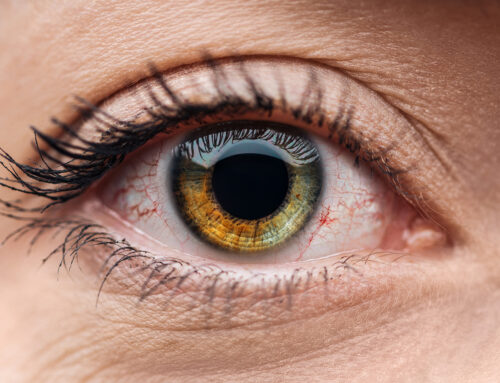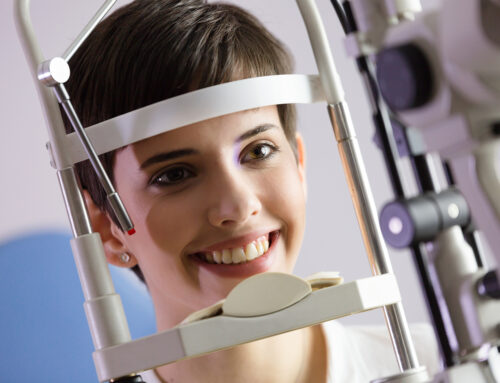If you have cataracts and age-related macular degeneration (AMD), you may be wondering if it’s safe to undergo cataract surgery. The answer to this lies in how mild, moderate, or severe your cataracts are, and if they can be removed without impacting your retina, and central vision.
To help in understanding whether it is safe for you, we’re going to outline what cataracts are, how they are treated, and how cataract surgery can impact dry, and wet age-related macular degeneration.
What Are Cataracts, and How Are They Treated?
Cataracts are a condition in which your eye’s natural lens becomes increasingly opaque or cloudy, resulting in blurry vision, faded colors, poor night vision, and issues with light (glares or halos). Cataracts typically form slowly and painlessly over time and can develop in one or both eyes.
In some cases, cataracts may be treated with visual aids such as better lighting, magnification, new prescription eyeglasses, or even specialized sunglasses. However, individuals that see no improvement with these treatment options, are often recommended for cataract surgery. With cataract surgery, a small incision is made in the front of the eye with lasers, and the clouded lens is removed and replaced with an artificial lens.
What Is Age-Related Macular Degeneration (AMD)?
Macular degeneration is a condition that damages the macula, which is the small central portion of the retina that allows you to see fine details clearly. With macular degeneration, your central vision may become blurry, or you may develop blind spots with it; however, your peripheral vision is not impacted. You can have either dry or wet age-related macular degeneration.
- Dry AMD occurs when the macula thins and causes small clumps of protein to develop. These clumps, called drusen, may distort your vision or make it difficult to see fine details.
- Wet AMD occurs when abnormal blood vessels behind the retina start to grow under the macula, leaking fluids as a result. This type of growth can cause rapid vision loss.
While there is no cure for macular degeneration, there are treatments available that can help to slow down its progression. These include lifestyle changes such as eating a healthy diet, quitting smoking, and exercising regularly. There are also medication options available that can help to slow the progression of wet AMD, called anti-VEGF therapies [1].
Cataract Surgery in Individuals With Macular Degeneration: Mixed Results
In individuals with AMD who are seeking cataract surgery, research suggests that there are mixed results in whether the AMD worsens or not. While it would seem that cataract surgery shouldn’t impact AMD, as cataracts are at the front of the eye (your lens), and age-related macular degeneration impacts the back of the eye (macula), this is not always the case as there are some risks involved.
What You Need to Know About Risks & Benefits
Current research suggests that cataract surgery may be beneficial in some individuals with AMD, or may not impact your AMD at all. However, there are some risks involved that may cause AMD to worsen:
- Some experts suggest that the inflammation created from cataract surgery may make AMD worse in some individuals [2].
- Others have noted that the new artificial lens you receive may not filter certain kinds of light wavelengths, as well as your natural lens did, worsening your AMD [3].
Is Cataract Surgery Safe With Dry AMD?
Cataract surgery is generally considered safe for those who have dry AMD, as current information on the relationship between the two suggests that dry AMD does not worsen with cataract surgery. However, post-surgery vision improvement varies from one individual to the next, and more long-term research is needed to understand the relationship between dry AMD and cataract surgery.
What About Cataract Surgery With Wet AMD?
Since wet age-related macular degeneration is less common, there is less information about the relationship between cataract surgery and wet AMD. However, with what we do know, cataract surgery is not recommended for those who have wet AMD, as there is a risk that inflammation [4] and the recurrence of leaky blood vessels after cataract surgery can make wet AMD worse.
Anti-VEGF Therapy for Wet Therapy & Cataract Surgery
If you are on anti-VEGF therapy for wet AMD, you may be able to have cataract surgery, as research suggests it is safer for you than someone with wet AMD who is not on anti-VEGF.
What to Consider With Cataract Surgery & AMD
While it is possible to have cataract surgery with AMD, the main consideration to look at is if the cataract surgery will improve your vision. If you have severe age-related macular degeneration, removing a cataract may not change your vision at all, making it an unnecessary procedure.
To determine if you should have cataract surgery, vision aids, magnification, and brighter lighting will be used alongside vision tests to determine how and if your vision will change and improve after cataract surgery [5, 6].
If you want to know if cataract surgery is right for you, consult with your cataract surgeon in Orlando today.




